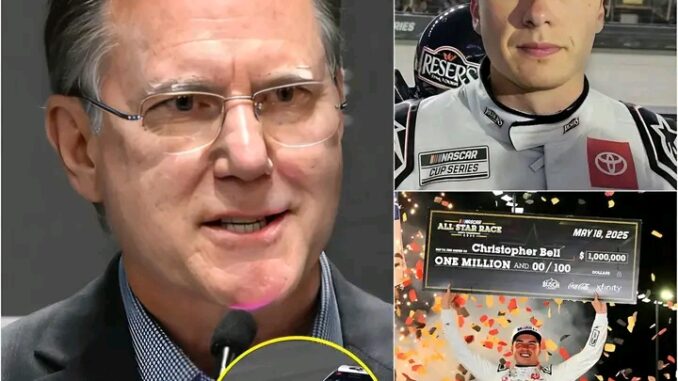
NASCAR has imposed a significant penalty on Christopher Bell following accusations of cheating to gain a competitive advantage during the 2025 All-Star Race. The Joe Gibbs Racing driver was found to have intentionally manipulated the race’s outcome by executing a wall-ride maneuver on the final lap, a tactic that had previously been deemed illegal after a similar incident by Ross Chastain in 2022. This maneuver allowed Bell to pass Bubba Wallace, securing a crucial point needed to advance in the playoffs.
In response to this violation, NASCAR officials conducted a thorough 27-minute review, ultimately concluding that Bell’s actions compromised the safety of the event. Elton Sawyer, NASCAR’s senior vice president of competition, emphasized that such maneuvers are prohibited to protect drivers and fans, stating, “When you look at it today, he clearly got up against the fence in 3 and 4 and rode the fence all the way off 4 there. That’s strictly to protect our drivers and our fans.”
As a result of the penalty, Bell was docked to the tail end of the lead lap, effectively removing him from contention for the NASCAR Championship 4. This decision has sparked controversy, with some questioning the severity of the penalty and its impact on the integrity of the sport. Despite the backlash, NASCAR has stood by its ruling, reinforcing its commitment to maintaining fair competition and ensuring the safety of all participants.
The incident has also led to broader discussions within the racing community about the boundaries of acceptable racing tactics and the enforcement of rules designed to uphold the sport’s integrity. While some have criticized the penalty as excessive, others argue that it serves as a necessary deterrent against actions that could jeopardize the safety and fairness of the competition.
Moving forward, NASCAR’s decision in this matter will likely influence how similar situations are handled in future races, setting a precedent for the enforcement of safety-related penalties and the interpretation of racing regulations.

Leave a Reply